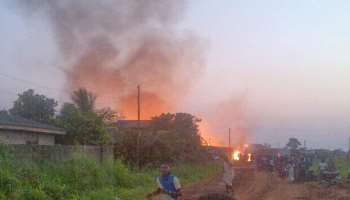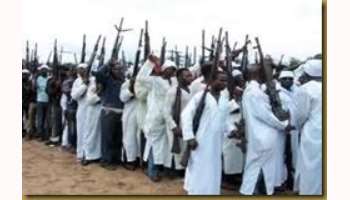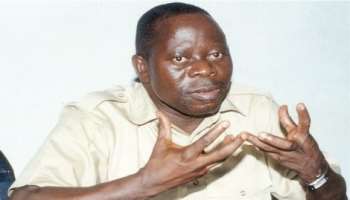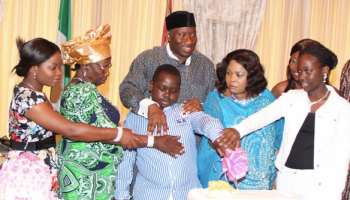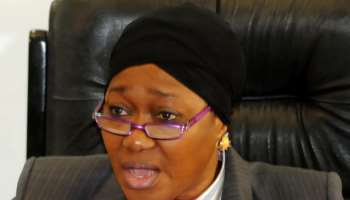Bin Laden: The terrorism czar finally bites the dust
Osama bin Laden Osama bin Laden, a fearsome king of global terrorism, met his waterloo early yesterday morning, when he fell to the superior firepower of the United States forces in Pakistan. Bin Laden, the man responsible for the infamous September 11, 2001 attacks on U.S and numerous other mass- casualty attacks against civilian and military targets was reportedly killed in his hideout in Abbottabad, Pakistan.
He has been on the American Federal Bureau of Investigation's lists of ten most wanted fugitives and most wanted terrorists for his involvement in the 1998 U.S. embassy bombings. And since 2001, the Saudi-born bin Laden and his organization had been major targets of the U.S. War on Terror. He was believed to be hiding near the border between Afghanistan and Pakistan's Federally Administered Tribal Areas with fellow al-Qaeda leaders. He also lost his American citizenship and was disowned by his billionaire family because of his dealings and advocacy of violent extremist jihad.
He was born on March 10, 1957 in Riyadh, Saudi Arabia to a wealthy businessman with close ties to the Saudi royal family. His father, Mohammed bin Laden, was killed in 1967 in an airplane crash in Saudi Arabia when his American pilot misjudged a landing, while his eldest half-brother and head of the bin Laden family, Salem bin Laden, was killed in 1988 when he accidentally flew a plane into powerlines near San Antonio, Texas. Bin Laden believed that the restoration of Sharia law will set things right in the Muslim world, and that all other ideologies, including “pan-Arabism, socialism, and communism, democracy”—must be opposed. These beliefs, along with violent expansive jihad, have sometimes been called Qutbism (the ideology of Sayyid Qutb. He believed Afghanistan under the rule of Mullah Omar's Taliban was “the only Islamic country” in the Muslim world. He consistently dwelt on the need for violent jihad to right what he believed were injustices against Muslims perpetrated by the U.S and sometimes by other non-Muslim states, the need to eliminate the state of Israel, and the necessity of forcing the U.S. to withdraw from the Middle East.
He also called on Americans to “reject the immoral acts of fornication (and) homosexuality, intoxicants, gambling, and usury. Probably the most infamous part of Osama's ideology was that civilians, including women and children, are legitimate targets of jihad. Osama was “anti-Semitic”, and delivered warnings against alleged Jewish conspiracies: “These Jews are masters of usury and leaders in treachery. They will leave you nothing, either in this world or the next, “he was once quoted as saying. Shia Muslims have been listed along with the Heretics, America and Israel, as the four principal “enemies of Islam.” Osama opposed music on religious grounds and his attitude towards technology was mixed. He was interested in “earth-moving machinery and genetic engineering of plants” on the one hand, but rejected “chilled water” on the other. After leaving college in 1979 bin Laden joined Abdullah Azzam to fight the Soviet Invasion of Afghanistan and lived for a time in Peshawar.
From 1979 through 1989 under U.S. Presidents Carter and Reagan, the United States Central Intelligence Agency provided overt and covert financial aid, arms and training to Bin-Laden's Islamic Jihad Mujahideen through Operation Cyclone. And by 1984, with Azzam, he established Maktab al-Khadamat, which funneled money, arms and Muslim fighters from around the Arabic world into the Afghan war. Through al-Khadamat, bin Laden's inherited family fortune paid for air tickets and accommodation, dealt with paperwork with Pakistani authorities and provided other such services for the jihad fighters. Osama established a camp in Afghanistan and with other volunteers fought the Soviets. It was during his time in Peshawar that he began wearing camouflage- print jackets and carrying a captured Soviet assault rifle.
The Iraqi's 1990 invasion of Kuwait marked the beginning of bin Laden animosity with the west and the Saudi kingdom. His attempt to persuade the Saudi authorities to reject the U.S. military support was reportedly rebuffed by King Fahd and this marked the beginning of the cold war between bin Laden and the land of his birth. He publicly denounced Saudi Arabia's dependence on the U.S. military, as he believed the presence of foreign troops in the “land of the two mosques” (Mecca and Medina) profaned sacred soil. Bin Laden's criticism of the Saudi monarchy led that government to attempt to silence him. Shortly after Saudi Arabia permitted U.S. troops on Saudi soil, bin Laden turned his attention to attacks on the west.
The highlight of his deadly campaign against the U.S and other western countries was the September 2001 twin bombing of U.S. World Trade Centre and Pentagon where over 3, 000 people reportedly lost their lives. And that episode marked the beginning of U.S. relentless campaign against terrorism and terrorism groups led by one of its former allies. The demise of Bin Laden has finally put a stop to the decade-long hunt of U.S most wanted terrorist mastermind.
Latest News
-
 "If You're For Me, I Am For You" - Cubana Chief P
"If You're For Me, I Am For You" - Cubana Chief P -
 "3 Days To Go" - Femi Adebayo Urges Fans To Get S
"3 Days To Go" - Femi Adebayo Urges Fans To Get S -
 "Stop Asking Me Questions About Speed Darlington"
"Stop Asking Me Questions About Speed Darlington" -
 "Benue Is The Most Underdeveloped State I've Ever
"Benue Is The Most Underdeveloped State I've Ever -
 Stan Alieke Urges Young Professionals To Take Lin
Stan Alieke Urges Young Professionals To Take Lin -
 Chizzy Alichi Teases Fans With Baby Reveal, Promot
Chizzy Alichi Teases Fans With Baby Reveal, Promot -
 "I'm Not Wearing Makeup From July 4th Till Decemb
"I'm Not Wearing Makeup From July 4th Till Decemb -
 "Stop The Challenge Of Mocking Kids With Down Syn
"Stop The Challenge Of Mocking Kids With Down Syn -
 Regina Daniels Celebrates Sons As They Mark Birthd
Regina Daniels Celebrates Sons As They Mark Birthd -
 Speed Darlington Threatens To Sue NAPTIP For Defam
Speed Darlington Threatens To Sue NAPTIP For Defam



